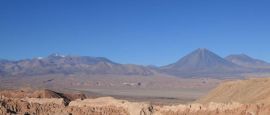Chile History, Language and Culture
History of Chile
Although today Chile is a democracy with a stable economy, partly thanks to its strong trade ties with the US, its history hasn’t always been harmonious. A conquered nation, like its neighbours, Chile went through colonisation in the north at the hands of the Spaniard Pedro de Valdivia, who then founded the capital Santiago in 1541.
In the south, it took European conquerors more than 300 years to colonise the resisting Mapuche Indians. With civil unrest developing due to Spain’s firm trade control and domination of farm estates, Chile was finally liberated in 1818 thanks to the Argentine José de San Martín and Bernarndo O’Higgins. The latter ruled Chile for six years and established Catholicism as the nation’s religion.
The regime seed had been sown, right from Chile’s birth. Generals have led military coups over the years, but the most prominent was General Pinochet, whose rule lasted 17 years until 1990. Imposing his extreme right-wing policies, Pinochet overthrew elected President Salvador Allende, killing and torturing thousands of Marxist Allende’s supporters and forcing others into exile.
However, Pinochet brought economic stability and in the 1989 elections he stepped down as leader. Patricio Aylwin won with 55% of the votes and so began the slow path to democracy. Since then, ruling parties have tended to be socialist and Chile voted in its first female president, socialist Michelle Bachelet, in 2006. Her successor, Sebastián Piñera, was from the right-wing Coalition for Change party, but his presidency didn’t last long: in 2014, Bachelet regained the country’s top job.
Chile has taken some hard knocks. An earthquake measuring 8.8 on the Richter scale hit in 2010 caused mass devastation. Nearly six months later, the trapping of 33 miners from a San José copper mine, and their subsequent rescue after 69 days, became a global news story.
Chile staved off recession in 2009, becoming an OECD member that same year. It remains one of South America’s most stable and prosperous nations despite slow economic growth, which has averaged less than 2 per cent since the leftist government of Michelle Bachelet took power in 2014. With presidential and congressional elections scheduled for November 2017, Bachelet's left-leaning coalition has a fight on its hands to retain power against the conservative opposition.
Did you know?
• The Atacama Desert, in northern Chile, is the driest non-polar desert on Earth, with some parts never having had any recorded rainfall.
• In the far south of the country lies the Cueva del Milodon, where 10,00 year-old remains were found of the huge, bearlike Mylodon, now extinct.
• Chile is one of the world’s biggest producers of edible seaweed, with the long, tubular cochayuyo one of its most popular varieties.




 You know where
You know where